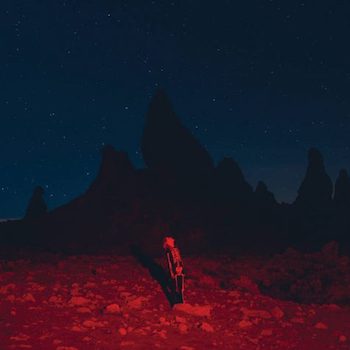Music Album Review: Phoebe Bridgers’s “Punisher” — A Stunning Sophomore Album
By Alex Szeptycki
Phoebe Bridgers has crafted a disc filled with pristine, meditative songs that carry a brutal emotional weight.

Phoebe Bridgers’s music feels as if it is driven by a constant interrogation of the musician’s memory. Various moments from the past are dissected — from relationships to drug trips to long car rides — in a search for meaning. On Punisher, her second full-length LP, the Los Angeles singer/songwriter’s quest pays off in marvelous fashion. She has crafted a disc filled with pristine, meditative songs that carry a brutal emotional weight.
Instrumentally, Punisher continues and then develops on the strengths of Bridgers’s debut, A Stranger in the Alps. Soft, understated melodies provide a tender platform for perceptive lyrics. “Garden Song” typifies her minimal approach: silky acoustic guitars are her only musical accompaniment. Her voice is high pitched and muted as she reminisces about her upbringing, singing “I grew up here, ‘till it all went up in flames/Except the notches in the door frame.” It’s an evocative image, one tinged with tragedy. The ending, though, is somewhat aspirational, as she muses, “I don’t know how but I’m taller/there must be something in the water.” She looks to the future, acknowledging how far she’s come. On the chorus, her voice is layered, lending the sound some extra heft. It’s an effect she used frequently on A Stranger in the Alps, and it’s lost none of its artful potency here.
That said, not every moment on Punisher is quiet. Bridgers knows when to turn up the intensity; her intuition makes these passages all the more impactful. “Kyoto” is a deceptively upbeat track, populated with bright horns and energetic guitars. But Bridgers comes off as detached from this fanfare; her mind wanders from boredom on tour to her fraught connection with her father. As the horns swell, she expresses her conflicted feelings: “I don’t forgive you/But please don’t hold me to it.” The contrast between the tune’s upbeat instrumentation and the downtrodden sentiments of the lyrics dramatically emphasize the singer’s conflict.
Punisher also sees Bridgers refining her craft as a lyricist. In particular, she has a talent for deconstructing her relationships with incisive honesty. On “Halloween,” the singer uses the holiday as an excuse to be someone else, singing “Baby it’s Halloween/We can be anything/Oh come on man/We can be anything.” But the tone isn’t celebratory — this call for disguise comes off as a plea rather than an invitation to play. Elsewhere, on “Moon Song,” she describes the devastating effects of unrequited love. Lines such as “So I will wait for the next time you want me/Like a dog with a bird at your door” are stark expressions of hopelessness. This dejected but gripping image drives the song’s despondent mood.
Nuance and honesty are the hallmarks of Bridgers’s work, even in the face of hardship. “Graceland Too” underscores how unflinching she can be. This folk ballad revolves around a woman who is dealing with serious mental health issues. The music weaves together a banjo, fiddle, and acoustic guitar. The opening line — “No longer a danger to herself or others/She laced up her shoes and made up her mind” — conjures up gray images of a mental hospital. Bridgers ends with the statement “whatever you want me to do, I will do.” It is the singer’s declaration of allegiance to the woman. The empathy is endearing, an offer of consolation at the end (or the beginning?) of a fraught road.
Also, it would be a mistake to think that Bridgers’s subjects are confined to the interpersonal and romantic; the album entertains a number of varied and creative ideas. “Punisher,” the title track, is a tribute to the late singer-songwriter Elliott Smith (his influence can be heard throughout the recording). The singer wonders, “what if I told you I feel like I know you/But we never met?” It’s a poignant moment, a reminder of the importance of paying homage to artistic inspiration. But, at the conclusion, Bridgers displays self-doubt. Is she the same kind of type of fan who leaves her exhausted? She sings, “I can’t open my mouth and forget how to talk/’Cause even if I could, wouldn’t know where to start/Wouldn’t know when to stop.”
Other tracks on Punisher deal with more abstract anxieties. “Chinese Satellite” grapples with belief, whether in religion, aliens, or some other higher power. Bridgers desires to believe in something, but she can’t quite bring herself to do so. She sings “I want to believe/Instead I look at the sky and I feel nothing/You know I hate to be alone/I want to be wrong.” She is mourning her own lack of faith. As the song crescendos, the strings and backing vocals feel almost heavenly — the bitter irony of the cliché registers existential dread.
Punisher’s closing track, “I Know the End,” is its highlight. The tune is an apocalyptic account of a road trip up the California coast, through areas whose landmarks include slaughterhouses, haunted houses, and spaceships. The instrumental component, filled with bright guitars and swelling horns, builds slowly. As the song reaches its peak, Bridgers yells “The end is near” — there is an explosion of noise, crashing drums cascading around a glorious mess of guitars, synths, and horns. This is a moment of chaotic rock perfection. Still, the pandemonium is tinged with anxiety, the exhilarating noise slowly descending into discord. This epic and harrowing journey serves as the perfect end to a stunning album.
Alex Szeptycki is a student from Charlottesville, Virginia, currently studying at Stanford University. He is majoring in American Studies, with a focus in Contemporary Art and Media. He is currently finishing up his senior year, before looking to pursue a career in writing or the arts.
